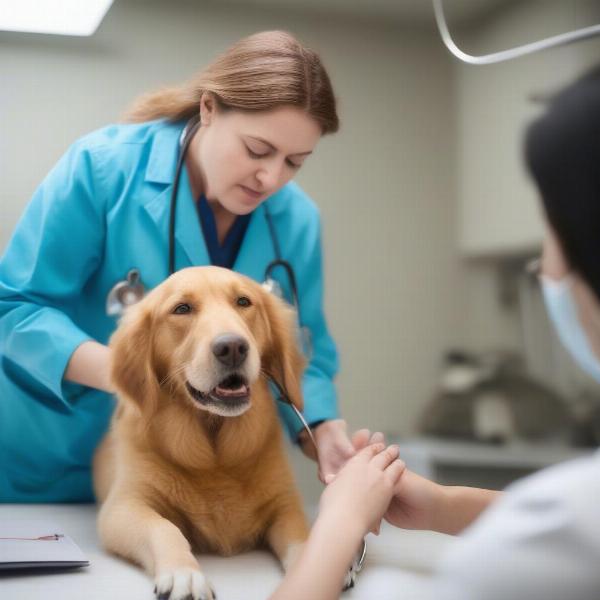Matcha, the vibrant green tea powder, has gained immense popularity for its health benefits in humans. But what about our canine companions? Is matcha bad for dogs? The short answer is: it’s complicated. While small amounts of matcha are unlikely to cause serious harm, the caffeine content can be a concern. It’s important to understand the potential risks and benefits before sharing your matcha latte with your furry friend.
Matcha contains beneficial antioxidants and can boost energy, just like in humans. However, the caffeine in matcha can be problematic for dogs, especially smaller breeds. Caffeine toxicity can manifest in symptoms like restlessness, tremors, increased heart rate, and even seizures. While a lick of your matcha ice cream might not be a big deal, regular consumption or large amounts can pose a real threat. So, how can you navigate this green tea dilemma and keep your dog safe?
Understanding the Risks of Matcha for Dogs
The primary concern with matcha for dogs is caffeine. Dogs are more sensitive to caffeine than humans, and even a small amount can cause adverse reactions. The size and breed of your dog play a significant role in determining their sensitivity. Smaller dogs are at a higher risk of caffeine toxicity. Puppies and senior dogs are also more vulnerable due to their less developed or declining metabolic systems.
Symptoms of caffeine toxicity in dogs can range from mild to severe and include vomiting, diarrhea, panting, hyperactivity, tremors, elevated heart rate, and in extreme cases, seizures or even death. If you suspect your dog has ingested a significant amount of matcha, contact your veterinarian immediately.
Can Matcha Offer Any Benefits to Dogs?
While caffeine presents a risk, matcha also contains antioxidants like catechins, which are known for their potential health benefits. These antioxidants can help protect cells from damage and may contribute to overall well-being. However, it’s crucial to remember that the potential benefits do not outweigh the risks associated with caffeine. There are safer ways to provide your dog with antioxidants through a balanced diet rich in fruits and vegetables.
What to Do if Your Dog Ingests Matcha
If your dog accidentally consumes a small amount of matcha, monitor them closely for any signs of caffeine toxicity. If they exhibit any unusual behavior or symptoms, contact your vet immediately. Provide your vet with details about the amount of matcha ingested and your dog’s breed, age, and weight. Quick action is crucial in managing caffeine toxicity.
Safe Alternatives to Matcha for Dogs
Instead of risking your dog’s health with matcha, consider providing them with dog-friendly treats and supplements that offer similar benefits without the caffeine risk. For example, certain fruits and vegetables are rich in antioxidants and can be incorporated into your dog’s diet. Always consult with your veterinarian before introducing new foods or supplements to your dog’s diet.
 Veterinarian checking a dog's health
Veterinarian checking a dog's health
Conclusion
While matcha may offer some potential health benefits, the caffeine content makes it a risky treat for dogs. The potential for caffeine toxicity outweighs any potential benefits. Always prioritize your dog’s safety and opt for safer alternatives to provide them with essential nutrients and antioxidants. If you have any concerns about your dog’s diet or if they accidentally ingest matcha, consult with your veterinarian for personalized advice.
FAQ
- What should I do if my dog drank my matcha latte? Contact your veterinarian immediately, especially if your dog is small or has any pre-existing health conditions.
- Are there any dog-friendly teas? Certain herbal teas, such as chamomile or rooibos (decaffeinated), can be given to dogs in moderation. Always consult your vet before introducing any new teas.
- Can antioxidants benefit my dog? Yes, antioxidants can be beneficial for dogs, but they can be safely obtained through a balanced diet and vet-approved supplements.
- What are the signs of caffeine toxicity in dogs? Restlessness, tremors, panting, vomiting, diarrhea, increased heart rate, and seizures are common signs.
- Is green tea safe for dogs? Even decaffeinated green tea can contain small amounts of caffeine, so it’s best to avoid it altogether.
- Are there any other human foods I should avoid giving my dog? Chocolate, grapes, raisins, onions, and xylitol (artificial sweetener) are some examples of foods toxic to dogs.
- What are some healthy treats I can give my dog? Fruits and vegetables like carrots, blueberries, and apples (without seeds or core) can be healthy treats in moderation.
Related Articles You May Find Helpful:
(Insert links to relevant articles on ilmdog.com here if applicable, otherwise remove this section)
About ILM Dog
ILM Dog is your trusted global resource for expert advice on dog care and breeding. We offer comprehensive, practical information on a wide range of topics, including dog breeds, health, training, nutrition, grooming, and more. Whether you’re a new dog owner or a seasoned expert, ILM Dog is here to help you provide the best possible care for your canine companion. We offer personalized guidance to match your unique needs, including breed selection, health management, behavioral training, and nutritional planning. Contact us for expert advice and support in raising a happy, healthy dog. Email: [email protected], Phone: +44 20-3965-8624.